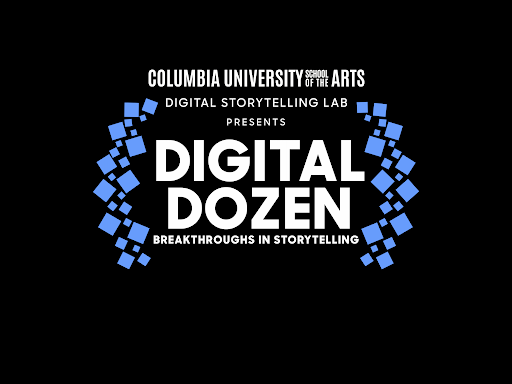
The fifth annual Digital Dozen Awards is set to be presented for the first time in a virtual ceremony this Wednesday, April 29. Viewers can visit Digital Dozen’s official website to see a curated version of the awards ceremony and the 12 winners on Thursday, April 30 after 10am ET. The virtual ceremony comes after the awards were presented at Lincoln Center’s Elinor Bunin Munroe Film Center for the past four years.
The 12 Breakthroughs In Storytelling awards will be presented by the Digital Storytelling Lab (DSL) at Columbia University School of the Arts. The Digital Dozen recognizes the best achievements in digitally enabled storytelling from around the world.
The Digital Dozen and the associated Breakthroughs in Storytelling Awards are run by DSL Founding Member and Director Lance Weiler and DSL Awards Director Frank Rose. The winners are chosen each February by an interdisciplinary committee of DSL members and Columbia faculty from a list of 100 to 150 projects.
The virtual awards program, which is scheduled to begin at 6:30pm on Wednesday, will be hosted by Weiler and Rose. The presenter who will hand out the 12 projects include Nick Fortugno, Chief Creative Officer and Co-Founder of the Brooklyn-based game developer Playmatics (and a member of Columbia’s DSL); Illya Szilak, co-creator of the VR film and installation ‘Queerskins,’ which won the DSL’s special jury prize last year; Nick Thompson, Editor In Chief of Wired; and Karen Wong, Deputy Director of the New Museum and Co-Founder of the art incubator New Inc.
Unlike most awards programs, the Digital Dozen has no categories. Since digital tends to blur categories, rather than maintain them, and people in every industry are learning to use the same tools, the awards ceremony has dispensed with categories. Instead, its voting members consider every industry, including advertising, marketing, art, entertainment, journalism and live performance, as well as every technology, from simple, Web-based interactivity to video games, AR and VR.
Any digitally enabled project with a narrative component produced anywhere in the world is eligible for consideration. Once the winners have been chosen, they are archived online in a special site designed to showcase their attributes and the response they’ve generated. This archive is intended to be of value to media scholars today and decades in the future, which is a commitment that is very much in line with the DSL’s, and Columbia University’s, educational mission.
